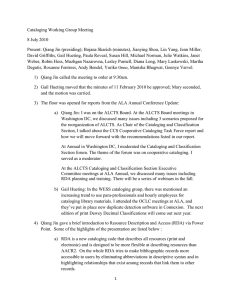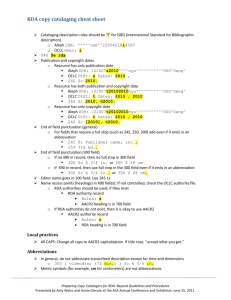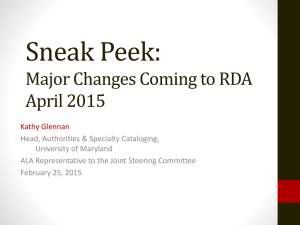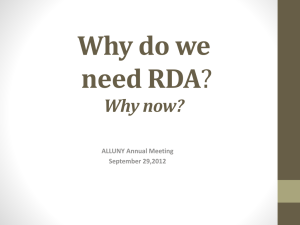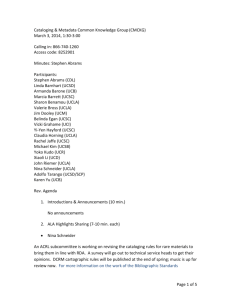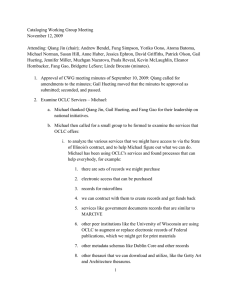CWG Meeting, Thursday, September 10, 9:30-11:00 (Grainger Commons) Attending:
advertisement
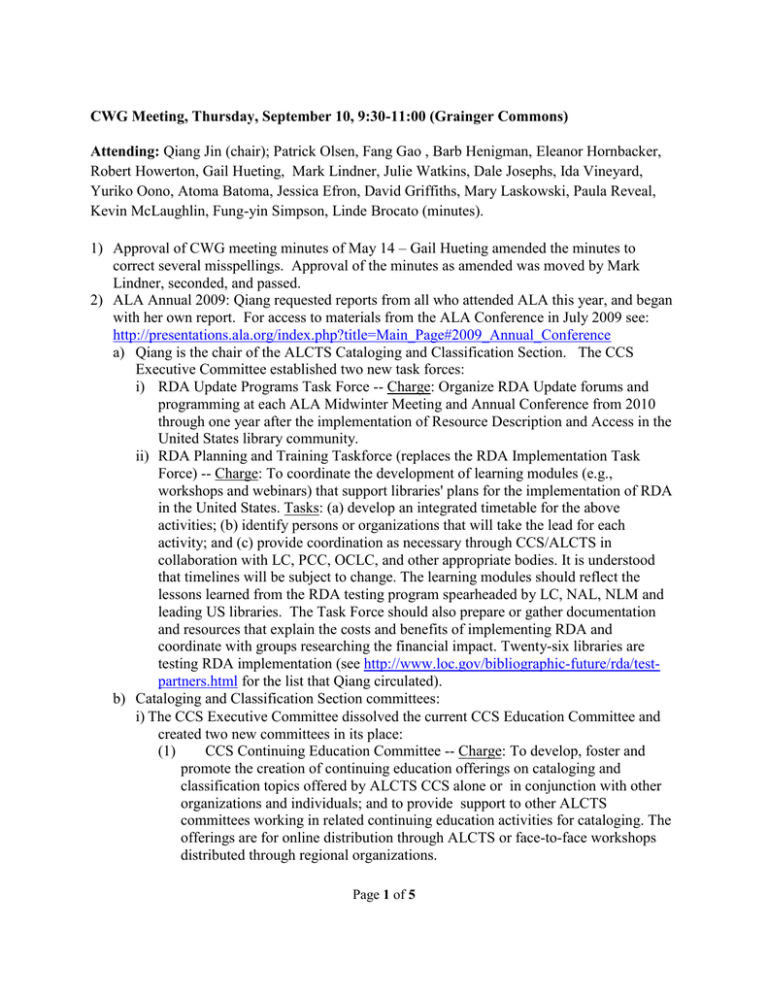
CWG Meeting, Thursday, September 10, 9:30-11:00 (Grainger Commons) Attending: Qiang Jin (chair); Patrick Olsen, Fang Gao , Barb Henigman, Eleanor Hornbacker, Robert Howerton, Gail Hueting, Mark Lindner, Julie Watkins, Dale Josephs, Ida Vineyard, Yuriko Oono, Atoma Batoma, Jessica Efron, David Griffiths, Mary Laskowski, Paula Reveal, Kevin McLaughlin, Fung-yin Simpson, Linde Brocato (minutes). 1) Approval of CWG meeting minutes of May 14 – Gail Hueting amended the minutes to correct several misspellings. Approval of the minutes as amended was moved by Mark Lindner, seconded, and passed. 2) ALA Annual 2009: Qiang requested reports from all who attended ALA this year, and began with her own report. For access to materials from the ALA Conference in July 2009 see: http://presentations.ala.org/index.php?title=Main_Page#2009_Annual_Conference a) Qiang is the chair of the ALCTS Cataloging and Classification Section. The CCS Executive Committee established two new task forces: i) RDA Update Programs Task Force -- Charge: Organize RDA Update forums and programming at each ALA Midwinter Meeting and Annual Conference from 2010 through one year after the implementation of Resource Description and Access in the United States library community. ii) RDA Planning and Training Taskforce (replaces the RDA Implementation Task Force) -- Charge: To coordinate the development of learning modules (e.g., workshops and webinars) that support libraries' plans for the implementation of RDA in the United States. Tasks: (a) develop an integrated timetable for the above activities; (b) identify persons or organizations that will take the lead for each activity; and (c) provide coordination as necessary through CCS/ALCTS in collaboration with LC, PCC, OCLC, and other appropriate bodies. It is understood that timelines will be subject to change. The learning modules should reflect the lessons learned from the RDA testing program spearheaded by LC, NAL, NLM and leading US libraries. The Task Force should also prepare or gather documentation and resources that explain the costs and benefits of implementing RDA and coordinate with groups researching the financial impact. Twenty-six libraries are testing RDA implementation (see http://www.loc.gov/bibliographic-future/rda/testpartners.html for the list that Qiang circulated). b) Cataloging and Classification Section committees: i) The CCS Executive Committee dissolved the current CCS Education Committee and created two new committees in its place: (1) CCS Continuing Education Committee -- Charge: To develop, foster and promote the creation of continuing education offerings on cataloging and classification topics offered by ALCTS CCS alone or in conjunction with other organizations and individuals; and to provide support to other ALCTS committees working in related continuing education activities for cataloging. The offerings are for online distribution through ALCTS or face-to-face workshops distributed through regional organizations. Page 1 of 5 ii) CCS Mentoring and Recruitment Committee -- Charge: To identify and propose methods and materials for recruitment to careers in cataloging; to plan, implement, and coordinate the mentoring program of library school students, of new professionals, and of professionals new to cataloging. iii) FAST—Qiang has been chairing this committee since 2004. There are around 1,000,000 FAST headings. The committee is exploring how to use a wiki-like structure for FAST to try to make use of comments. Many need more crossreferences, and they’re exploring social tagging. c) Gail Hueting attended the all-afternoon RDA session, and reported that they are progressing but more will be clear after testing. They showed sections how to work with hypertext but this is not finished. d) Gail also attended the WESS Cataloging Discussion Group, which had a demo of the Virtual International Authority File (VIAF). The VIAF (http://viaf.org/) is working on coordinating authority work in Western European languages, which should be particularly useful for NACO work. e) Barb Henigman reported comments by Beacher Wiggins (LOC) at AALL: the Library of Congress is ready to go on RDA testing except that they’re waiting for the testing software to be finished, and it might not make fall deadlines. The Library of Congress is not testing until the final version of RDA is released. f) Fang Gao informed the meeting that GSLIS is a testing site for implementation of cataloging instruction, as soon as RDA is completed and released. UIUC’s library is not a testing customer, but GSLIS is participating. If anyone is interesting in participating, s/he should contact Fang (fgao@illinois.edu) or Michael (manorman@illinois.edu). The question is how to provide training: begin with the history of cataloging up to RDA, or just train with RDA. 3) Report of Ethics of Information Organization Conference: Mark Lindner a) This May, the first annual conference on “The Ethics of Information Organization was held in Milwaukee. Next year, it will be held at the University of Tennessee at Knoxville, TN. i) The program can be found at: http://www4.uwm.edu/sois/cipr/ioethics_program.html and there are links to videos of the presentations. Presentations on which Mark made particular comments (scare quotes indicate words directly quoted from Mark’s remarks): (1) Claire Beghtol discussed the history of assumptions about “Users, the User, a User” (2) David Bade critiqued communication theory à la Shannon and Weaver, which is prevalent in LIS research, and explored Aristotelian notions of ethos, logos, and pathos instead. (3) Janet Swan Hill, in “According to Code” suggested that our “great failure” is treating things as if the only issues were time and money. (4) Julianne Beall talked about MARC field 083 and using various DDC numbers to adequately represent racially mixed people. This would allow classifying beyond our 11digit limit with Dewey numbers. (5) Richard P. Smiraglia presented on “Bibliocentrism, Cultural Warrant, and the Ethics of Resource Description: A Case Study.” Page 2 of 5 ii) In addition, 6 of the papers can be found in CCQ 47:7 (2009) (although none of the keynote presentations). iii) The absence of OCLC from the conference was noted, and those present determined to invite vendors next year. 4) Voyager topics a) Voyager issues: Michael Norman was ill and didn’t attend. b) WebVoyage holdings displays and MFHD 866 fields: Barb Henigman had wanted to ask about suppression of holdings lines in displays of serials in WebVoyage, but it’s now moot, as the (f)upgrade was a disaster and we went back to the previous version. This is accomplished by using 3 rather than 0 in the second indicator of the 863 field in the MFHD, which only a few people knew about. A discussion of the rationale of doing this ensued, and implementation of this requires detailed and accurate 866, which is the case for the Law Library and is not the case for other libraries, in particular Main Stacks. Linde Brocato suggested that such suppression might be a problem for researchers, as it requires a further step to know what volumes are really available (on the request page, the drop-down menu would presumably display each item). i) The discussion turned to the OPAC in general, and Mary Laskowski asked if anybody was working with CARLI on the Vu-Find interface, as the display for items often doesn’t include subfields. Fang Gao suggested sending comments to Peggy Steele. 5) OCLC Enhance: a) Gail Hueting reported on progress on getting the “Enhance” login for UIUC. She hasn’t submitted our application, and needs suggested record numbers from everyone. The date she suggested for getting records to her was 17 September, and she will send out a reminder over LIBCAT. [Minute-taker’s note: as I didn’t get the minutes done and out by that date, nor did I see an announcement about or over LIBCAT, I suspect a later date will be forthcoming]. Qiang pointed out that she’s been using the Enhance login, and it seems to be working, although it’s apparently not official. Gail noted that we should pursue this because we have some good original cataloging coming out. b) Expert Community: It’s not clear what Enhance will mean in the future, because OCLC is retaining the functionality of the Expert Community Experiment beyond August 2009. Between February and August 2009, more than 100,000 replacements were done; 1,690 did at least one replace during the experiment with 368 institutions having activity each month. There is a Webinar to recap the experiment (21 and 25 September), and Gail is registered. See: http://www.oclc.org/US/EN/worldcat/catalog/quality/expert/ (link to the webinar is on the right) 6) OCLC Parallel records: Gail Hueting a) OCLC has clarified its policy for entering parallel records, and is encouraging catalogers with full authorization to add them (there was a Webinar in June). Duplicates have been allowable since 2007, and OCLC now wants to develop clusters of records in various languages for the same title with one record per language of cataloging, linked by field 936. They would then presumable display as one result but indicate which languages are in the database. They would rather NOT have hybrid records, in which information in a different language of cataloging is added. What one can do: i) Enter parallel records in English as needed by deriving a master record (per Barb’s question, Gail noted that there is at present no distinction between US and non-US English for records) from any record with $b in the 040 field. Update or enhance Page 3 of 5 English-language records to a higher level. The 936 field can only refer to the foreign-language record from which the English-language record is derived, not all the other foreign-language records, which would take more time, although it would be fine to also cross-reference to other records. It’s an important field, though, and is necessary to set up the record clusters. ii) Report duplicate foreign-language records (e.g. two records in German) iii) Report hybrid records. 7) NACO Report: Gail Hueting a) As of July 2009, we had submitted 229 new name authority records and 70 changes, which means we will more than meet our NACO obligation of 200 records for 20082009. b) There have been requests for training in authority work, so Gail will hold an overview on authority records in early October (probably Tuesday 13 October in the morning). At that time, she will describe NACO. After that, probably in November, she will conduct NACO training, open to librarians and graduate assistants doing cataloging. There will be three sessions, all in one week or over a couple of weeks, depending on who does the training.. Fang Gao suggested weekly follow-ups to continue training. Discussion turned to the NACO group, and reinstating it. Fang pointed out that we are involved in a lot of retrospective cataloging of serials that involves authority records for corporate bodies. c) On training in general: We have held a number of training sessions over the last two years: basic Dewey, LC subject headings, WebDewey, and LC tools. Which of these should be given priority for repeating for a wider audience? In the past year, training has been held regularly for GAs in CAM, and a GA in Acquisitions has been creating video tutorials. Is there a training that you do beyond one-on-one that might be good for a wider audience? i) Mary Laskowski suggested sending this out to a larger group, and raised the question of whether everyone who needs to be is on LIBCAT. Upon being asked, Eleanor said that GAs were added to the file server, not to LIBCAT. It was suggested that we send out a note about LIBCAT on LIBNEWS with instructions on how to subscribe to LIBCAT and how Units can submit lists of people who need to be added. 8) FRBR/FRAD/RDA training: Qiang and opened to all. FRBR and FRAD are entityrelationship models. The question is how to train people? Use vendor materials or our own in training? Discussion also included training at various levels, librarians as well as staff. Here are summarizing comments largely by the individuals who made them, as the discussion went back and forth a good bit. The final take was that we should study further in smaller groups of librarians rather than with wider groups of staff until there’s more documentation, so steps are suggested for forming such smaller groups. i) Gail Hueting pointed out that there will be a lot of training materials coming out in the RDA testing process, and we should make use of them. For now, we can begin with the models. ii) Barb suggested that we should be sure to include our local policies, and examine what’s going to change with those in the framework of RDA; she also pointed out that the testing process will indicate a lot of things to include, and we should take advantage of them by not rushing. Further, while the LC is committed, it also has Page 4 of 5 Voyager, and it’s not clear if Voyager will be able to implement RDA. The question raised apropos of GSLIS in training will be important: can we use the past? iii) Mary Laskowski also suggested that if we wait until the testing process is further along, training will include more practical application rather than not. She also suggested that we should talk about the structure of the models, not just their application, and asked if we could develop a list of suggested readings (Mark Lindner committed to compiling this). In discussing training, she pointed out that meetings for librarians as lunch would be good, but for staff she would suggest something like cookies and milk during work hours. iv) It was noted that Cataloger’s Desktop contains FRBR. Mark pointed out that RDA isn’t complete. Linde suggested that the model requires critiquing as well, and also suggested that, if we have lunch meetings, we should invite Allen Renear to talk with us, and that the “Suggested Readings” should include his papers on FRBR. v) Gail suggested continuing discussion / examination in the CWG group. The structure of further discussion and training was left open. 9) Announcements: All a) New members: i) Jessica Efron, cataloging Geology maps for Oak Street ii) Patrick Olsen, replacing Chris Cook as the manager of the Rare Book Cataloging Project, after being his assistant. b) Mary Laskowski pointed out that a number of people stopped her on her way to the meeting to say they couldn’t come to Grainger. Is another venue possible, whether in the Main Library or in ACES? We might get a bigger or a different crowd. c) Qiang raised the question of whether to continue the CWG meetings, to which there was an overwhelming majority in support of continuing to meet. d) Linde Brocato reported that there had been an exhibit in the 1st floor hallway of the Main Library on cataloging, dealing with the importance of cataloging, the main benefits of cataloging, and the embarras de richesses of 19th century materials in our cataloging. It was duly noted that she is the perpetrator of said exhibit. 10) It was moved that the meeting adjourn at 11:00, seconded, and overwhelmingly approved. Respectfully submitted, Linde M. Brocato Version 1.0, 19 September 2009 (with apologies for tardiness) Version 1.1, 21 September 2009 (corrections per GH) Page 5 of 5
